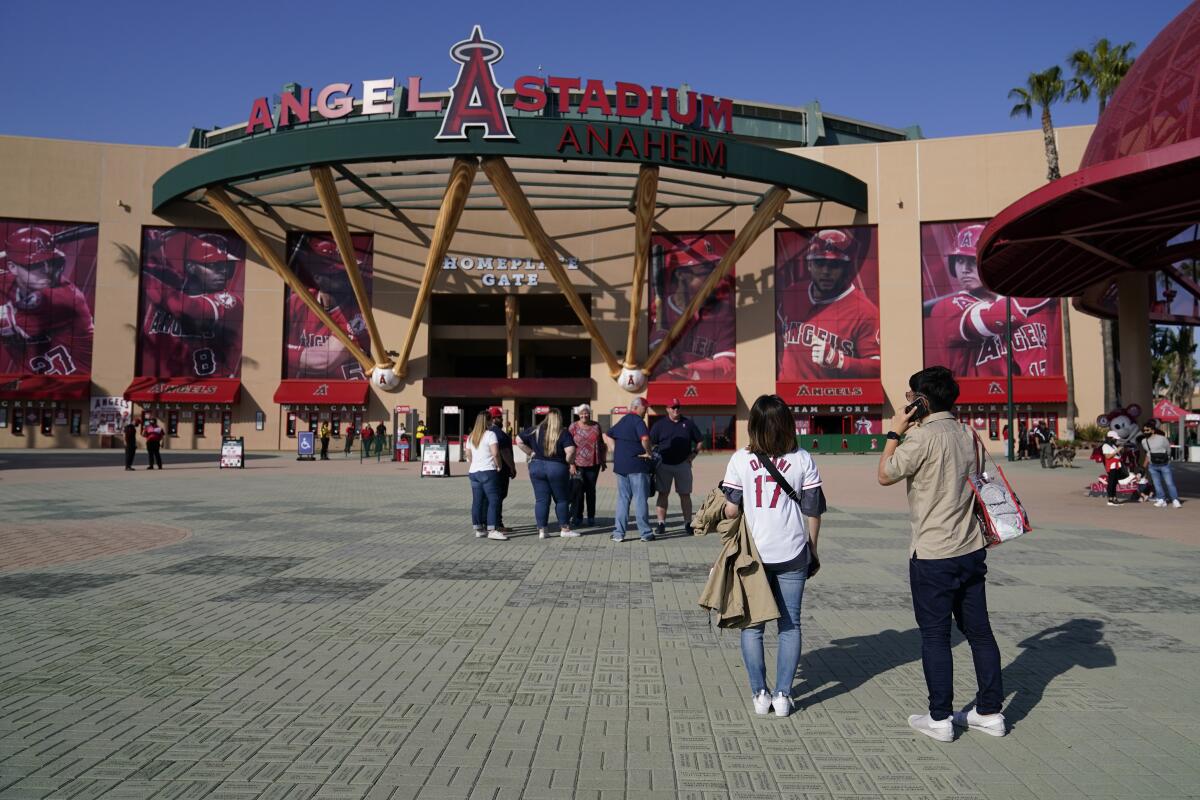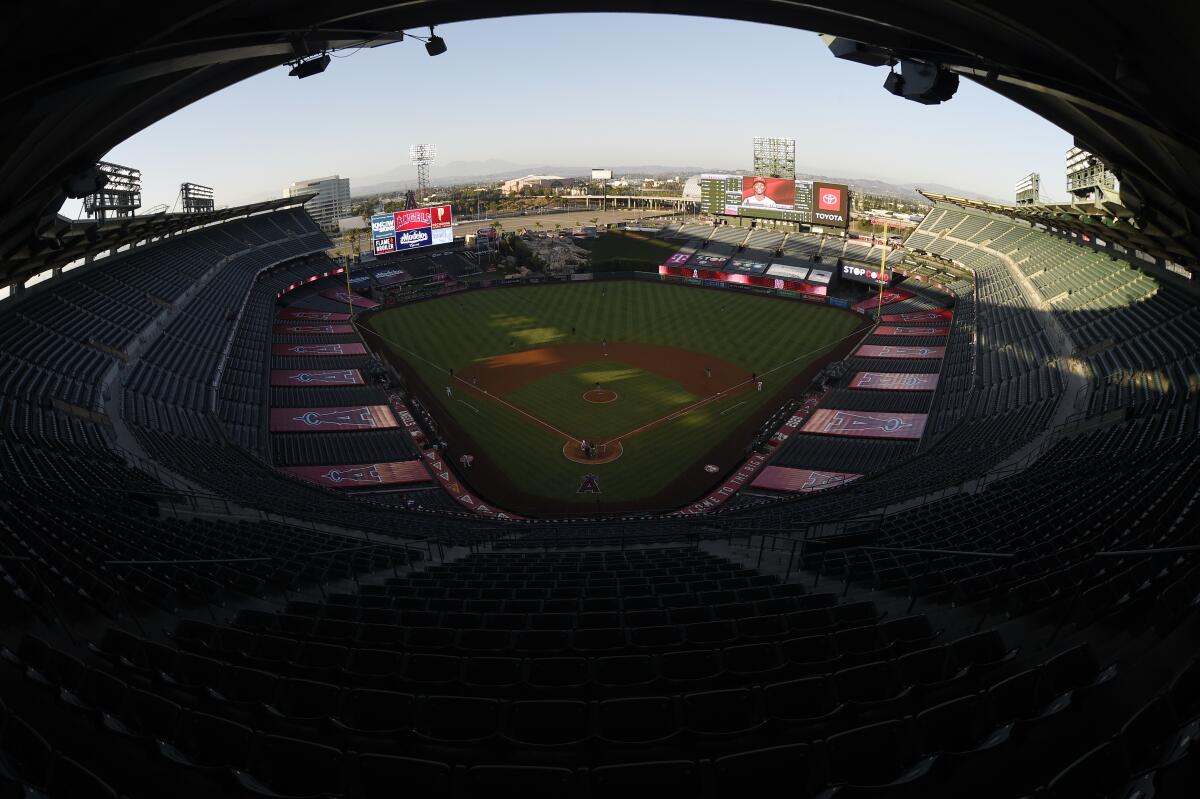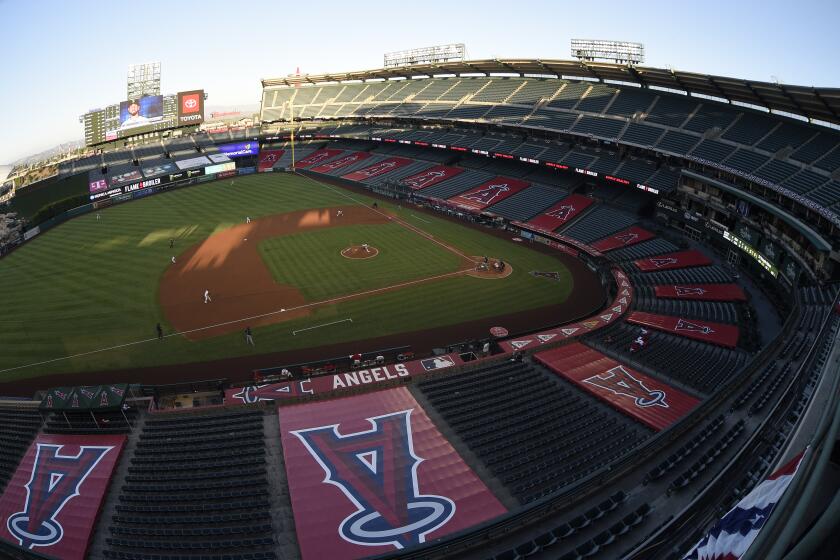News Analysis: Who wants Angel Stadium land deal to fail? It’s not easy to say

- Share via
Traditionally, January is a romantic month on the baseball calendar. The new year is here, and no team has lost a game. Fans go giddy when they see pictures of trucks loaded with team equipment, rumbling down highways toward spring training.
There is no romance this January. Major league owners have locked out players, and spring training is in jeopardy. Owners are pointing the finger at players. Players are pointing the finger at owners. And, with the Angel Stadium land sale in jeopardy, the city of Anaheim is pointing its finger at … well, the city won’t say.
In September 2019, the City Council decided to sell the land to a company controlled by Angels owner Arte Moreno, according to sworn testimony provided two weeks ago by a councilman and the former city manager. The council made the decision behind closed doors, using a state law that allows a city to keep discussions of “price and terms” in a negotiation private. Yet, according to a city timeline, the city did not formally negotiate with Moreno’s company until November 2019.
In the next month, the city faces two challenges to the viability of the Angel Stadium land sale.
The decision to sell the land thus should have been made publicly, a citizens’ group alleges in a lawsuit that seeks to invalidate the sale. The city’s formal legal response is due this week, with a trial set next month.
However, the city issued a statement denying wrongdoing and adding this curious sentence: “Some simply don’t want to see a stadium agreement go forward for their own reasons, and this claim and much around it reflects that.”
No one on the City Council has said he or she does not want to see a stadium agreement. Who are these nefarious souls the city claims are trying to sabotage the deal?
I wanted to ask Harry Sidhu, the mayor. Sidhu promised Moreno — and the citizens of Anaheim — that he would deliver a deal to keep the Angels in town for the long term. Sidhu represented the council in negotiations with Moreno’s company. He should be able to say who these culprits are, and why he believes they are standing in the way of progress.
“Mayor Sidhu is not available for an interview with The Times at this time,” city spokesman Mike Lyster said.
That is disappointing but not surprising. In more than three decades of covering political debates and legal cases involving the city and the Angels, every mayor until this one has been readily and regularly available for comment. Tom Daly, Curt Pringle and Tom Tait do not think alike politically, and relations with the Angels have ranged from jubilant to frosty over the years, but the three previous mayors were happy to explain the city’s positions to the hundreds of thousands of Anaheim residents, and to the millions of Angels fans.
Anaheim is in trouble with the state because the city didn’t put up the Angel Stadium land for bid before selling it to the Angels.
City Councilman Trevor O’Neil was kind enough to comment. He declined to say who might want a stadium agreement to fail, or why, but he strongly defended the sale, which would allow Moreno’s company to build a neighborhood and entertainment district upon the sea of parking lots that currently surround the stadium.
“It’s no surprise that there are critics to the approved deal, as the future of Angel Stadium has been mired in politics and misinformation for over a decade,” O’Neil said. “Regardless of political or personal opinions, I am proud to have supported a transparent, fair market deal that will bring an estimated 45,000 jobs, a billion dollars in economic investment, and tens of millions of dollars in new annual tax revenue to support city services and neighborhoods ― and we keep baseball in Anaheim for at least 30 more years.”
The deal is in peril on two legal fronts. The state housing agency has warned the city that the deal is illegal because it violates a law intended to give affordable housing developers priority in buying public land; the city has until Feb. 6 to resolve the matter.
The lawsuit alleging the city violated state laws designed to ensure public business is done in public view is set for trial Feb. 14. It is no secret that city officials are furious with Councilman Jose Moreno (no relation to Arte Moreno), who voted against the deal and now has provided testimony that has been used against the city in that lawsuit.
“Just because something doesn’t go your way does not make it unlawful,” the city statement read, without citing any names.
The possibility that the deal could be derailed has reopened debate about whether the city got fair market value for the 150-acre property without soliciting bids. The debate is not about whether to develop the land, with Arte Moreno’s company assuming the costs and the city boosting its tax base. The debate is not about keeping the Angels in town for decades, with the team responsible for the costs of upgrading or replacing the stadium.

The debate about fair market value might have been avoided had Sidhu been up front about his plan. On Jan. 15, 2019, Sidhu solicited — and received — council approval for the city to extend the Angels’ opt-out rights for another year, through 2020. He did not explain how that approval also reinstated the Angels’ lease, and with it their ability to control development on most of the land through 2038, thus lowering the market value to other potential bidders.
Even though the council members all wanted to keep the Angels, the lack of transparency that night set up cries that persist to this day. On Dec. 20, 2019, the day the council approved the deal, Sidhu said what he should have said 11 months earlier: “We cannot see a value of $500 million and have baseball.”
The sale price was announced at $325 million, in line with a city-commissioned appraisal. Nine months later, the city agreed to development credits toward the inclusion of parkland and affordable housing within the project, lowering the cash price to $150 million. One option to settle the violation of the state affordable housing law: a fine of $96 million, which would lower the net cash price to $54 million.
Since real estate values have increased in the three years since the deal, Councilman Avelino Valencia said he would like the city to commission a new appraisal for the land, and to consider selling the fraction of land on which the Angels do not control development.
“The violation of state law has provided a second chance to evaluate other opportunities or to redo the deal in order to secure a more equitable outcome,” Valencia said.
Said Ashleigh Aitken, who is running against Sidhu for mayor: “It should be done in the open. It should be done transparently. And, as you’re seeing with the state issue, it should be done legally. I don’t think that’s too much to ask of your local government.”
But, as Aitken knows, asking the Angels to renegotiate the deal could kill it entirely. In 2015, the city asked her father, attorney and longtime Orange County power broker Wylie Aitken, to revive talks with Moreno.
Moreno said no. In 2013, he had reached a deal with the city, but the deal collapsed amid council debate. In 2019, the council approved the deal he had reached with the city, and inviting a renegotiation now might yield another no. None of this is on him. It is up to the city, not Moreno, to ensure the deal complies with the law.
Moreno is 75. The land could sit undeveloped for another two decades, with the city generating no new taxes rather than millions every year, and he might decide to let someone else worry about it.
Within a month, the city might have a final deal. The state housing agency has offered alternatives to resolve the violation of state law. Lawsuits alleging violations of open government laws are difficult to win. Sidhu still has the votes on the council, should another vote become necessary.
Not everyone wants this stadium agreement, perhaps. But just about everyone wants a stadium agreement of some kind, and there is no need to demonize the anonymized owners of dissenting opinions.
More to Read
Go beyond the scoreboard
Get the latest on L.A.'s teams in the daily Sports Report newsletter.
You may occasionally receive promotional content from the Los Angeles Times.









